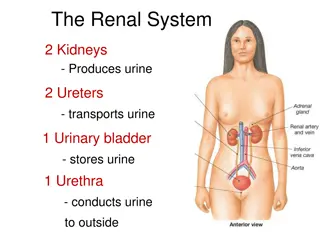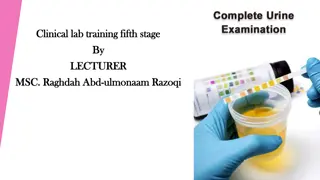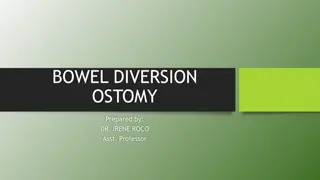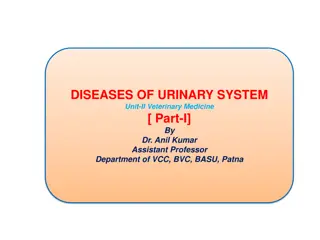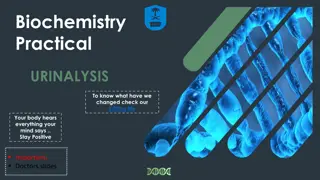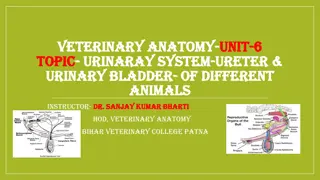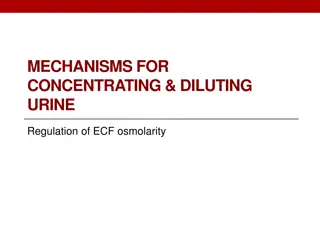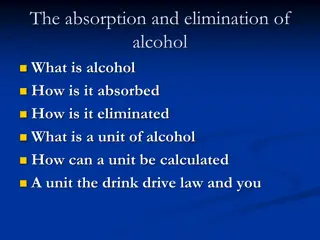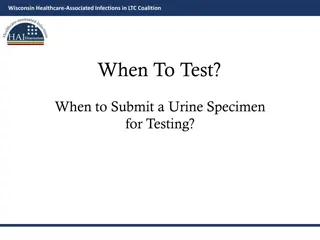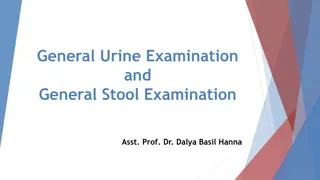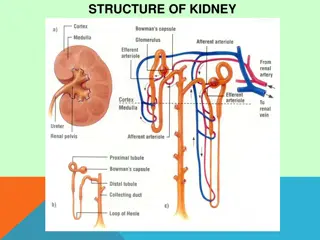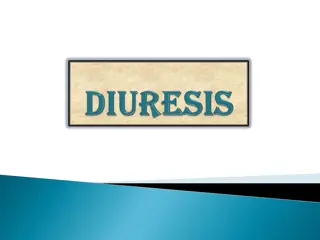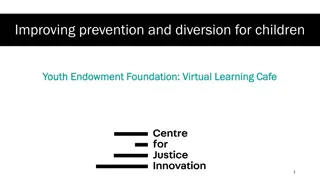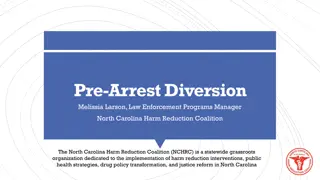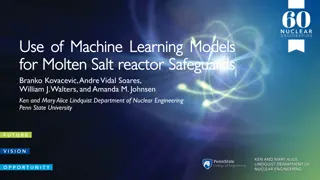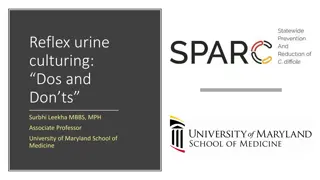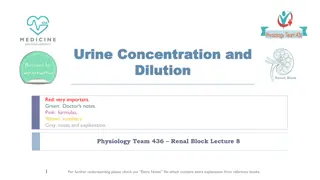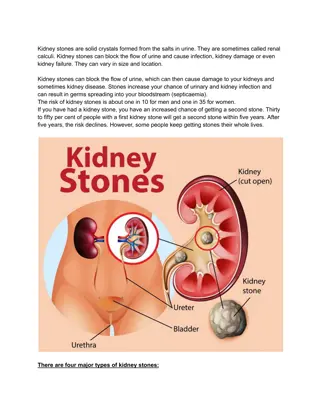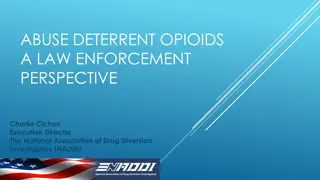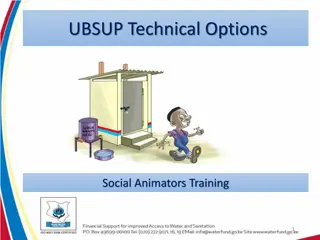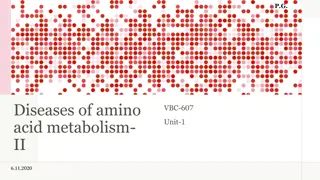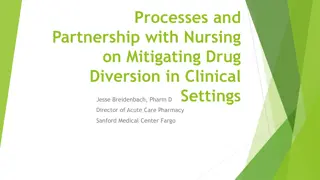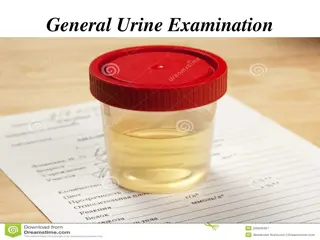Youth Diversion - Annual Report Highlights
The 48th Annual Report of Youth Diversion highlights their mission to help youth overcome challenges by providing prevention, intervention, and educational services. The report includes updates on the board of directors, fundraising efforts, and strategic planning initiatives. Notable achievements i
0 views • 15 slides
Understanding Urinary Elimination: Anatomy, Physiology, and Function of the Kidneys
The lecture covers the fundamentals of urinary elimination focusing on the kidneys' location, structure, function, and the role of nephrons. It discusses the transport of urine through the ureters to the bladder, highlighting the bladder's muscle layers and the urethra's role in expelling urine. Stu
3 views • 37 slides
An Overview of the Renal System and Nephron Anatomy
The renal system consists of the kidneys, ureters, urinary bladder, and urethra, responsible for producing, transporting, storing, and excreting urine. The kidneys are surrounded by three layers, and the nephron is the functional unit responsible for filtering blood and producing urine. Key componen
4 views • 26 slides
Understanding Urinalysis: Importance and Interpretation
Urinalysis is a crucial diagnostic test used to detect various disorders like infections, kidney diseases, and diabetes by examining the physical, chemical, and microscopic properties of urine. It involves assessing color, specific gravity, and chemical content, such as pH and protein levels. The in
0 views • 22 slides
Supporting Children and Young People with Learning Disability and Autism in Liaison and Diversion Services
Marie Hunt, Programme Manager, discusses the importance of supporting children and young people with learning disabilities and/or autism in contact with Liaison and Diversion services and Young Offenders Institutions. The research explores key findings, national data, recommendations, and the role o
0 views • 21 slides
Understanding Bowel Diversion Ostomy: Definition, Classification, and Management
Bowel diversion ostomy involves creating an opening in the gastrointestinal tract to divert and drain fecal material. This summary covers the definition, purpose, classification (permanent vs. temporary ostomies, types of intestinal ostomies), management, assessment, and changes associated with osto
0 views • 14 slides
Understanding Urinary System Function in Veterinary Medicine
The urinary system in veterinary medicine involves the anatomy and physiological functions of maintaining body fluid composition and volume. Key processes like urine production, filtration, reabsorption, and regulation through nephrons play vital roles in maintaining overall health. This article cov
1 views • 14 slides
Understanding Urinalysis: Importance and Interpretation of Urine Analysis Parameters
Urinalysis is a crucial diagnostic tool that provides valuable insights into various health conditions through the examination of urine physical and chemical properties. This examination helps in detecting abnormalities such as diabetes, renal failure, dehydration, and infections. By understanding t
1 views • 11 slides
Veterinary Anatomy of Urinary System in Different Animals
The urinary system in animals includes kidneys, ureters, and the bladder, all crucial for filtration and urine excretion. The ureters are excretory ducts from the kidneys, while the bladder stores urine before expulsion. Various diagrammatic structures illustrate the urogenital system of animals, pa
0 views • 20 slides
Understanding Mechanisms for Concentrating & Diluting Urine in Maintaining ECF Osmolarity
Explore the intricate processes involved in concentrating and diluting urine to regulate extracellular fluid (ECF) osmolarity through mechanisms like the loop of Henle and vasa recta. Understand the factors influencing the ability to create a concentrated medullary gradient, differentiate water diur
0 views • 26 slides
Understanding Alcohol Absorption, Elimination, and Units: A Comprehensive Overview
Alcohol, specifically ethanol, is absorbed through the stomach and intestines into the bloodstream within minutes, and it is primarily eliminated through breath, sweat, urine, and the liver. The concept of a unit of alcohol helps in calculating safe consumption levels, with factors like volume and a
3 views • 16 slides
**Wisconsin Healthcare-Associated Infections in LTC Coalition: Urine Testing Guidelines**
The Wisconsin Healthcare-Associated Infections in LTC Coalition provides guidelines on when to test and submit urine specimens for testing in long-term care facilities. The focus is on reducing unnecessary urine testing, introducing tools like the UTI Stoplight Tool and the When To Test-Nursing Tool
5 views • 16 slides
Understanding General Urine Examination and Stool Examination
General urine examination involves analyzing the color, clarity, and chemical composition of urine, providing insights into various health conditions and potential issues. It helps in detecting metabolic disorders, kidney diseases, and drug abuse. Additionally, the general stool examination is essen
0 views • 37 slides
Understanding Nephritis: Causes, Symptoms, and Subtypes
Nephritis is a serious medical condition characterized by inflammation of the nephrons in the kidneys. This inflammation can lead to various subtypes such as glomerulonephritis and interstitial nephritis, each with its own causes and symptoms. Common symptoms of nephritis include edema, changes in u
0 views • 26 slides
Analysis of Urine Composition in Volunteers Under Various Conditions
This study involved measuring the volume and composition of urine from four groups of volunteers under different conditions: control, water intake, saline intake, and Lasix administration. The data recorded included urine volume, osmolality, pH, Na+ concentration, flow rate, and Na+ excretion rate,
0 views • 18 slides
Understanding Prosecutor-Led Diversion Programs in Criminal Justice
Explore the various aspects of prosecutor-led diversion programs, including their goals, target populations, and potential challenges. Learn about different models such as Pretrial Diversion and Deflection Models, and access valuable resources for further study and evaluation.
0 views • 12 slides
Enhancing Prevention and Diversion Efforts for Youth Justice Reform
This content discusses the Youth Endowment Foundation's initiatives in improving prevention and diversion strategies for children at risk of entering the youth justice system. It covers the current landscape, areas for improvement such as equal access to diversion, inspection frameworks, data collec
0 views • 43 slides
Effective Implementation of Civil Citation and Prearrest Diversion Programs in Florida
Civil Citation and Similar Prearrest Diversion Programs in Florida provide an alternative to judicial handling for misdemeanor offenses by focusing on preventing further delinquency. Legislative requirements authorize judicial circuits to establish these programs, specifying eligibility criteria, im
0 views • 17 slides
Common Laboratory Techniques in Zoology - Urine and Stool Specimen Analysis
In the Biology Department at Al-Mustansiriyah University, students learn laboratory techniques for collecting and analyzing urine and stool specimens. The process involves random urine sample collection, urine tests for chemical components, urine culture, stool specimen analysis for pathological con
0 views • 10 slides
Juvenile Justice Diversion Programs: Principles and Importance
Explore the concept of diversion in juvenile justice, which involves redirecting young offenders away from formal legal proceedings towards community support. Learn about the guiding principles, importance, and various diversion programs at regional and international levels. Understand how diversion
0 views • 15 slides
Quick Guide to Updating VHASS Diversion, Clinical, and Blood Availability Boards
Accessing and updating the VHASS Diversion, Clinical, and Blood Availability Boards involves a simple 5-step process that should not take more than 2 minutes. Begin by logging into www.VHHA-MCI.org with valid credentials, navigate to the Emergency Operations Page, and contact the RHCC if needed. The
0 views • 6 slides
Understanding Law Enforcement Assisted Diversion (LEAD) Program
Law Enforcement Assisted Diversion (LEAD) program aims to reduce unnecessary involvement in the criminal justice system for individuals with behavioral health disorders. It diverts low-level drug and prostitution offenders to community-based treatment and support services, improving public safety an
1 views • 12 slides
Implementing LEAD Program for Pre-Arrest Diversion in North Carolina
North Carolina Harm Reduction Coalition (NCHRC) implements harm reduction interventions, public health strategies, and justice reform through programs like LEAD (Law Enforcement Assisted Diversion). LEAD diverts low-level drug offenders and sex workers to treatment instead of the traditional crimina
0 views • 7 slides
Machine Learning for Molten Salt Reactor Safeguards
Molten salt reactors face challenges in material accounting due to liquid fuel which precludes traditional safeguards. This project proposes a two-step approach involving the development of measurement signatures created by material diversion, and a machine learning model to distinguish normal react
1 views • 18 slides
Reflex Urine Culturing in UTI Diagnosis: Dos and Don'ts
Reflex urine culturing is a crucial diagnostic strategy for UTIs in hospitalized patients, emphasizing the importance of suspicion over urinalysis. Misuse can lead to increased positive cultures. Understanding the relevance to SPARC and focusing on diagnostic stewardship can help prevent unnecessary
0 views • 21 slides
Understanding Substance Use Disorder and Medication Diversion
Substance use disorder (SUD) can affect anyone regardless of age, occupation, or background. This training module covers the identification of SUD, best practices for prevention, and the impact of opioid use disorder. It emphasizes the importance of recognizing medication diversion and provides insi
0 views • 19 slides
Understanding Urine Concentration Mechanisms in the Renal System
The lecture covers the concepts of urine concentration and dilution in the renal system, focusing on the loop of Henle and countercurrent multiplier and exchange systems. It discusses how the loop of Henle reabsorbs salt and water to determine urine osmolarity, factors influencing medullary gradient
0 views • 20 slides
Planning a New Prosecutor-Led Diversion Program: Common Issues and Considerations
This presentation explores the concept of diversion, particularly prosecutor-led diversion programs, their history, common issues to consider when planning such a program, and the roles and responsibilities involved. The discussion delves into the meaning of diversion, prosecutor-led diversion, a br
0 views • 28 slides
USDA Foods Ordering Overview: Direct Delivery and Diversion Process
This overview provides detailed information on the USDA Foods Ordering process, focusing on Direct Delivery and Diversion options. Learn about ordering breakdowns, timelines, reminders, and programs like DoD Fresh Fruit and Vegetable. Understand the steps to order in advance, schedule deliveries, se
0 views • 13 slides
Kidney Stone Treatment in Pune with Dr Abhijit Gokhale
Kidney stones are solid crystals formed from the salts in urine. They are sometimes called renal calculi. Kidney stones can block the flow of urine and cause infection, kidney damage or even kidney failure. They can vary in size and location.\n
0 views • 4 slides
Opioid Abuse Deterrent Strategies: Law Enforcement Insights
The National Association of Drug Diversion Investigators (NADDI) focuses on combating prescription drug diversion through advocacy, training, and collaboration with law enforcement. They address the misuse of opioids like OxyContin and Oxycodone, showing successes in reducing diversion and deaths in
0 views • 14 slides
Expert Panel on Diversion Planning and Implementation Meeting Report
A detailed overview of the Expert Panel on Diversion Planning and Implementation Meeting including its purpose, composition, authority, and focus on providing technical advice for freshwater and sediment diversion projects, particularly in the Mississippi River and Louisiana restoration efforts. The
0 views • 10 slides
Understanding Sanitation Options for Efficient Waste Management
Sanitation goes beyond just toilets and encompasses a complete waste management system involving storage, collection, transport, treatment, and reuse. Various technical options are available, such as double vault urine diversion toilets (UDDTs) and water-based toilets. Pros and cons exist for each o
0 views • 12 slides
Understanding Maple Syrup Urine Disease and Albinism
Maple Syrup Urine Disease (MSUD) is a metabolic disorder affecting the breakdown of branched-chain amino acids, leading to severe symptoms like physical and mental retardation, sweet-smelling urine, and metabolic acidosis. Treatment involves dietary restrictions and potential gene therapy. Albinism,
0 views • 16 slides
Innovative Approach to Conflict Resolution in Homelessness Crisis
Cleveland Mediation Center (CMC) employs a Diversion Conflict Resolution Approach to address homelessness crisis as effectively as conflicts. By applying the Empowerment Theory of Conflict, they empower individuals in crisis to regain control over their situations and lives. Through a strength-based
0 views • 11 slides
Understanding Medicaid and Your Local Diversion & Transition Team
Learn about Medicaid, important acronyms, when to consider applying, what Medicaid can do, and who should make a referral. Find information on services, eligibility, and how Medicaid can support long-term care needs such as nursing facilities and assisted living. Explore resources for individuals un
0 views • 44 slides
Understanding the Risks of Sensitive Sectors in Free Trade Agreements
Explore the intricacies of sensitive sectors in Free Trade Agreements (FTAs) through an in-depth analysis of the potential dangers and benefits. Delve into the complexities of preferential tariff cuts, trade creation versus diversion, rules of origin, and the exemption of sensitive sectors. Learn ho
0 views • 27 slides
Strategies for Mitigating Drug Diversion in Clinical Settings
Strategies for preventing drug diversion in clinical settings are crucial for patient safety and workplace integrity. The presentation by Jesse Breidenbach, Pharm.D., explores successful structures, myths, and the prevalence of drug diversion in healthcare. It emphasizes the need for tight control o
0 views • 31 slides
Milton Keynes Youth Justice Support Service Overview
The Milton Keynes Youth Justice and Support Service presented their Promoting Reintegration and Reducing Exclusion project, offering education and speech therapy to at-risk children identified by the Early Support Project. The service focuses on diversion and prevention, including assessments, train
0 views • 11 slides
Understanding General Urine Examination
General Urine Examination involves analyzing waste products, collection of urine specimens, factors affecting urine amount, preservation methods, physical examination characteristics like color and transparency, specific gravity, odor, and chemical properties including pH, protein, glucose levels. I
0 views • 13 slides


